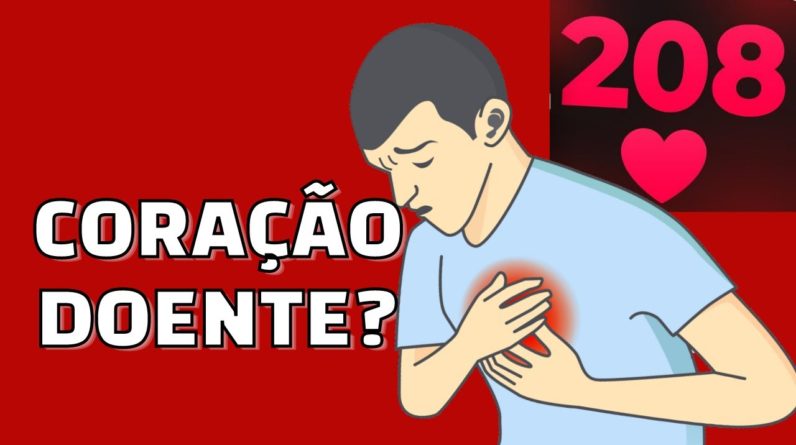
Hello! What does your heart rate say about you? I'm sure you know how important it is to maintain a healthy heart. But, maybe you didn't know that with a simple heart rate measurement, which takes 15 to 30 seconds, we can get a sense of your heart's health. In this video I'm going to talk about heart rate. What is the normal heart rate? What is the maximum heart rate? How to measure heart rate correctly, what factors can influence your heart rate? And if your heart rate is too high or too low, what to do? These and other questions I will answer here. But first, already enjoy the video, subscribe to the channel so you don't miss our health tips, and activate the bell to receive notifications And it's also very important that you spread this knowledge with your friends and family.
Because when it comes to your health, our health is worth sharing! So share there! And tell me: what's your resting heart rate ? Hang in there and tell me. What part of Brazil or the world are you from? Write down there! Come on! What is the normal heart rate? How many times does our heart beat per minute? You know the answer? Normal resting heart rate ranges between 50-100 beats per minute. This in Brazil, 50-100 beats, in the world between 60-100 bpm. We Brazilians are a little more bradycardic than average. Generally, a lower resting heart rate reflects that your heart function is more efficient or you are in better cardiovascular fitness.
Are you an athlete, or have you been an athlete? I have elite athlete patients whose heart rate is below 40 beats per minute, and of course they don't have any heart problems. But, if a person, who is not an athlete, is old, and arrives with a heart rate of 38 and complains of shortness of breath and dizziness, I will think that he needs a cardiac pacemaker or is taking some medicine that is causing that. So heart rate is a vital sign that reflects your heart health or a potential health problem. Now, if your resting heart rate is above 100 beats per minute it may reflect your degree of anxiety, you are too stressed, or that you are drinking too much coffee, too much caffeine, not getting enough sleep, because lack of sleep increases adrenaline, or you have an illness, such as an infection, pulmonary embolism, decompensated heart failure. So heart rate can be affected by factors like stress, anxiety, hormones, medication and how physically active you are. Heart rate is a parameter that varies a lot throughout the day. Our heart does not beat with the regularity of a clock.
It speeds up and slows down depending on your need for oxygen you need or because of your nervous system. So your heart rate will vary throughout the day. In the morning, when it's quiet, it can be close to 60, but if you're late, it will reach 100, 110. This is normal. Now, an always high resting heart rate – you're going to measure it's 120, or always a very low 40 bpm – could be signaling something. When your resting heart rate is above 100 bpm we call it Tachycardia And when your resting heart rate is below 60 bpm or 50 bpm in Brazil we call it Bradycardia What other factors can influence heart rate? – Age – a baby has a very high heart rate, and an elderly person, usually lower.
So with age our heart rate tends to drop. – * Fitness and physical activity levels (the more conditioned, the more athlete you are, the lower the heart rate) * * Being a smoker – increases the heart rate. * * Having cardiovascular disease, especially if untreated or decompensated, your heart rate usually gets higher. * * Temperature- if it's too cold your heart rate goes up (and increases your risk of arrhythmia and heart attacks, too) * * Emotions- you're stressed, it goes up, calmer, it goes down * Body size- if you're obese, your rate heart rate will be higher. * Medicines – some medicines can speed up the heartbeat and others can reduce the heart rate. How to measure your heart rate? All you will need is a watch. There are several places in the body where the arteries are very close to your skin, so they are easier to feel. The two easiest places to feel are: here on the neck or on the wrist.
You can place your index and third finger on the neck next to the windpipe. Or, if you find it easier, place two fingers between the bone and the tendon over the radial artery – located on the thumb side, okay, here. When you're feeling the pulse, put the watch on for 15 seconds and multiply the number by 4 – e.g. you felt 20 x in 15 seconds – 20×4 = 80. Or, you can also dial 30 seconds and multiply by 2 – You felt 40x in 30 seconds= 80.

Either measurement is valid. Why is it important to know your resting heart rate? The 2010 WHI study of nearly 130,000 postmenopausal women indicated that a resting heart rate in the lower extremity, ie closer to 60 bpm, may offer some protection against heart attacks. Those who had the highest resting heart rates — more than 76 beats per minute — were 26% more likely to have a heart attack or die than those with the lowest resting heart rates. —62 beats per minute or less. Oh, I went to measure here and my resting heart rate is 80. And now. First of all, it's normal! Relax Like I said, you may have had too much coffee, be more stressed, slept poorly. But if you want to lower your resting heart rate you have to exercise and if you are overweight you have to lose weight. If you start an exercise program, you can expect to lower your resting heart rate by up to one beat per minute each week you train. And this reduction usually reaches a plateau up to 10 or 12 beats. But, if you were sedentary and now loved to exercise and became a gym rat, you can even become bradycardic.
If, even with physical exercise, you were unable to do so, you should stop smoking (because nicotine is a stimulant). I think you should stop smoking at the same time you start exercising, because it will make you more excited. Don't drink too much – because too much alcohol increases your heart rate and increases your risk of arrhythmias. And talk to your doctor about some medications – for example – medication for ADHD, depression, weight loss, and allergies can increase your resting heart rate.
What is your maximum heart rate? The math is simple: 220- your age 220- I'm 44 years old= my maximum heart rate is 176 bpm We normally lose 1 beat per minute per year in maximum heart rate, that's why I can't reach more than 200 beats per minute not even if I want to. This maximum heart rate gives us the idea of the ideal heart rate to train that heart rate in the target zone. The target zone, you must stay between 50% of this value up to 85%.
For example 40 years old, the maximum heart rate is 180bpm. For the target zone it would be between 90 bpm and 153 bpm. I'll leave a table up here. You can pause or take a screenshot to remind yourself of your target heart rate during physical activity. Target heart rate during moderate-intensity activity is around 50-70% of maximum heart rate, while during more vigorous physical activity it is around 70-85% of maximum heart rate. What I recommend is that if you're starting a physical activity program, don't go to the pot too thirsty. Start with a heart rate around 50% of your max, and build up gradually until you can maintain a workout around 70% to 80% of your max heart rate.
Over time, you will be able to comfortably exercise up to 85% of your maximum heart rate Did you like the video? Did you learn more about heart rate? How to measure heart rate, what is your normal heart rate and what is your maximum heart rate? Hope so. Remember to share so more people have this knowledge. And what's the next video you'll watch? I'm going to give you two recommendations here- my channel record video- symptoms your body gives before a heart attack AND my video about coffee. Is coffee bad? Is it good for your health? My name is André Wambier, cardiologist And this is cardiodf.com.br Remember to subscribe And see you in the next video Thank you very much!.







